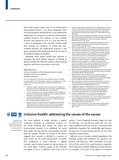| dc.contributor.author | Marmot, M. | |
| dc.date.accessioned | 2021-02-24T11:56:06Z | |
| dc.date.available | 2021-02-24T11:56:06Z | |
| dc.date.issued | 2018 | |
| dc.identifier.citation | Marmot, M. Inclusion Health: Addressing the Causes of the Causes, The Lancet, Vol 391 January 20, 2018 | |
| dc.identifier.uri | https://opendocs.ids.ac.uk/opendocs/handle/20.500.12413/16392 | |
| dc.description.abstract | The social gradient in health describes a graded association between an individual's position on the social hierarchy and health: the lower the socioeconomic position of an individual, the worse their health.
The fact that the social gradient extends from the highest echelons of society to the lowest suggests that everyone is affected to a greater or lesser extent by the social determinants of health. One component of social cohesion is making common cause between people at various points on the social ladder. However, people at the extremes can appear to be on a different scale to the rest of society. F Scott Fitzgerald famously began his story The Rich Boy, “Let me tell you about the very rich. They are different from you and me”.
In societies with substantial inequality, the considerable gap between the top 0·1% of income earners and the rest of society threatens social cohesion. | |
| dc.publisher | Elsevier Ltd. | |
| dc.rights.uri | http://creativecommons.org/licenses/by/4.0/ | |
| dc.title | Inclusion Health: Addressing the Causes of the Causes | |
| dc.type | Article | |
| dc.rights.holder | © 2017 The Author(s). Published by Elsevier Ltd. | |
| dc.identifier.externaluri | http://dx.doi.org/10.1016/S0140-6736(17)32848-9 | |
| dc.identifier.ag | ES/F02679X/1 | |
| dc.identifier.doi | 10.1016/S0140-6736(17)32848-9 | |


